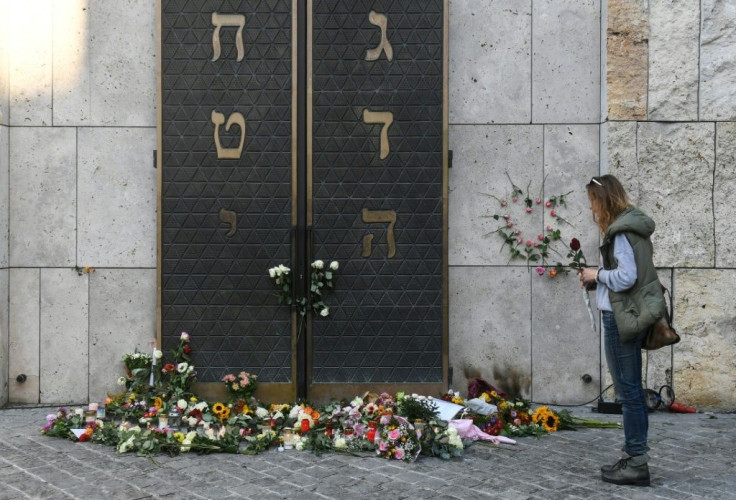Tragedy Marks Sabbath For Germany's Jewish Community

Jews in Germany prepared to mark the Sabbath Friday with their confidence in the community's miraculous rebirth shaken by the deadly anti-Semitic rampage in Halle on Yom Kippur.
Nearly 75 years after the Holocaust, the Jewish minority that had staked its faith in peaceful, democratic Germany found itself asking troubling questions about its security after the synagogue siege by a suspected neo-Nazi.
"We have always been careful and now we will be even more careful," said Nina Peretz, head of Berlin's Fraenkelufer synagogue community group.
Peretz was speaking a few hours before the dusk service to mark the Sabbath at the temple, which was destroyed by the Nazis during the Kristallnacht pogrom in 1938, rebuilt after the war, and is now undergoing a renovation.
Several members of the congregation that had gathered in Halle to support its small Jewish community on the high holiday will be welcomed at Peretz's synagogue in the capital.
The terrified group of about 50 worshippers barricaded themselves inside as 27-year-old German Stephan Balliet tried and failed to blast his way into the Halle temple with gunshots and explosives.
Authorities say he had intended to commit a "massacre" with his "act of terror". When his initial plan was thwarted, he gunned down two people seemingly chosen at random.
A video believed to have been made by the assailant shows him launching into a diatribe against women and Jews and denying the Holocaust, before beginning the attack.
As the 225,000-strong Jewish community prepared to end the week, calls to "fill the synagogues" abounded on social media with the hashtag #showupforshabbat, which started in the wake of the shooting one year ago at Pittsburgh's Tree of Life synagogue that claimed 11 lives.
'Confronted with death, hatred'
When the sun sets in Halle, residents in a symbolic show of support will form a human chain around the temple, which was targeted after a steady rise in anti-Jewish attacks in Germany in recent years.
Experts say the threat comes both from homegrown far-right extremists, a group to which Balliet allegedly belongs, as well as from Muslim immigrants from Arab countries.
An influx of tens of thousands of Jews from the ex-Soviet Union after the 1989 fall of the Berlin Wall gave the community in Germany a new lease of life, albeit not without tensions between the natives and the newcomers.
The arrival over the last decade of a wave of young Israelis put off by their government's hardline policies gave German Jewish life another shot in the arm.
While security measures had been stepped up at many Jewish sites in recent years, particularly in Germany's largest cities, police defended a lack of patrols in Halle Wednesday, saying they could not ensure blanket protection.
The German political establishment takes pride in the renaissance of Jewish life in the country, seeing it as a vote of confidence in its sacrosanct culture of atonement for six million Jews slaughtered during World War II.
The Halle assault, however, revived lingering doubts among Jews about the country's commitment to its safety.
"Although this country brought so much pain and suffering to European Jewry, we call it our home," said German Jewish writer Mirna Funk, who has considered emigrating to Israel to escape the anti-Semitism in her home country.
She described living a "constant contradiction" as "wierd and often unbearable" but that "being confronted with death and hatred while choosing this country is, plain and simple, sad."
Torah and yoga
Peretz said Jews in Germany were always walking a fine line between asserting their right to be here while not exposing themselves to abuse or worse.
"We always encourage people who ask us, do wear your kippa and speak Hebrew in the street, but don't do it in a dangerous place, not when you're alone at night in the subway," she said.
Yiddish book clubs, raucous rave parties for Purim (Jewish carnival), open houses for non-Jews on the Sabbath, yoga sessions followed by Torah study -- all are part of the "new" Jewish culture in Germany, particularly in anything-goes Berlin.
Peretz spoke of a spiritual "gold rush, a startup feeling over the last few years" -- a vitality the community hadn't seen since the Nazis took power in 1933.
"Because now the Jews are diverse, the options they are building themselves now are also diverse," she said.
Striking a note of defiance, Peretz said that although the community was rattled by the week's violence, it had no intention of being cowed.
"We will never, never again be hidden Jews in Germany, we are part of this society and we won't hide," she said.
© Copyright AFP 2024. All rights reserved.











